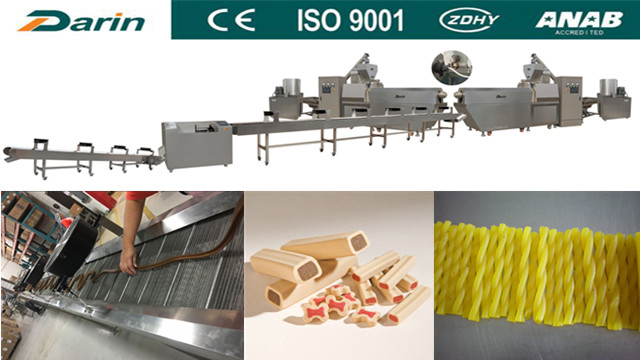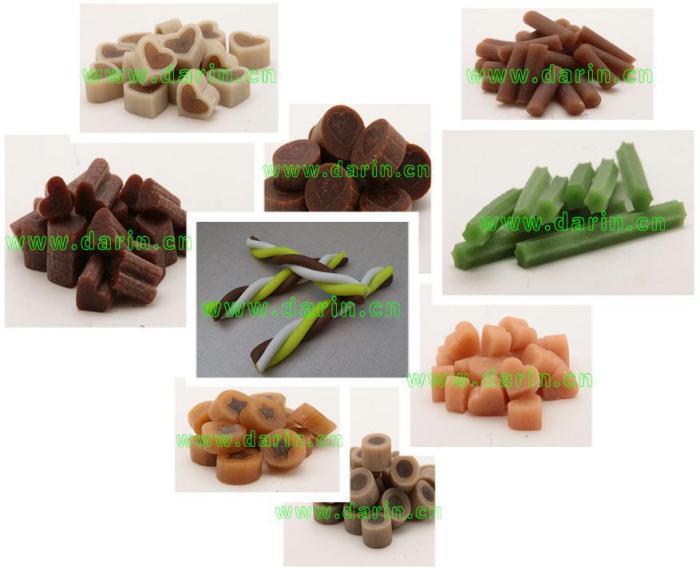According to French media, whether China’s great ambitions on electric vehicles will cost foreign automakers, Beijing will announce a much-anticipated legal document in the next few weeks to determine the field of electric vehicles in the next few years. Game rules. When foreign automakers are active in China, the government is seeking legal advice to make them sweat.
Pet Treats Extruding Line is used to produce pet treats and dog snacks. The products can be various, such as double-color, single-color, core filling, single twisting, double twisting, etc.
Pet Treats Extruding Line combines two processing lines into one. With different moulds, various shapes can be made, such as strip, stick, screw shape, etc.
Also, we can provide all kinds of recipe to make different tastes to full the demands of pet both for nutrition and chewing hobby.
Flow chart: Raw Material Mix – Screw Conveying – Extruding – Cooling – Cutting – Cooling.
Pet Treats Extruding Line Pet Treats Extruding Line,Pet Food Making Machine,Dog Treats Extruding Line,Snack Chews Extruding Machine Jinan Darin Machinery Co., Ltd. , https://www.globaldarin.com
China will legislate to determine the rules of the electric vehicle industry. Foreign businessmen are sweating. Beijing's goal is very ambitious. Since 2025, it has sold 3 million new energy vehicles every year. This figure is more than 10 times. In order to develop the market and get rid of the current costly purchase subsidies, the government is thinking about new quotas and points systems.
According to the report, the draft being studied first requires that the new energy vehicles produced by automakers in 2018 should reach at least 8% of total production (10% in 2019 and 20% in 2020). This requirement is implemented by all car manufacturers that produce cars in China or import more than 50,000 cars a year in China. For example, Peugeot Citroen, which sold more than 700,000 vehicles in China with its partner Dongfeng Motor last year, will need to produce no less than 56,000 electric vehicles in two years.
In addition, the law has also begun to establish a new energy vehicle points system. Overall, the more new energy vehicles in production, the more points manufacturers get. Manufacturers can resell points to other traditional car manufacturers. This system is similar to the one currently implemented in California. The latter is very beneficial to Tesla. Above these new rules, there is also an strengthening of existing CO2 emissions regulations.
Goldman Sachs pointed out: "The leading companies in electric vehicles such as BYD are the biggest beneficiaries." Many of the articles in this draft are of concern to foreign manufacturers. Florens Degordfim, chairman of the Automotive Working Group of the European Union Chamber of Commerce in China, said: "We have an objection to the idea of ​​setting up an electric car share system. We call for restrictions on carbon emissions so that car manufacturers can go by themselves. Choose the technology necessary to meet your carbon emissions requirements."
In addition, the biggest concern for foreign manufacturers is technology transfer. Unusually, the German ambassador to China even published an article in the South China Morning Post to discuss the draft law. He believes this will force foreign manufacturers to "100% transfer technology to these joint ventures in China, mainly state-owned enterprises." In order to authorize the production of new energy vehicles, the draft being discussed requires manufacturers to prove that they have the technology to design, develop and produce electric vehicles in China.
German Economy Minister Sigma Gabriel mentioned this topic during his recent visit to China. The Minister of Industry and Information Technology of China assured him that German automakers would receive the same treatment as Chinese automakers. However, other foreign manufacturers did not mention the guarantee.


